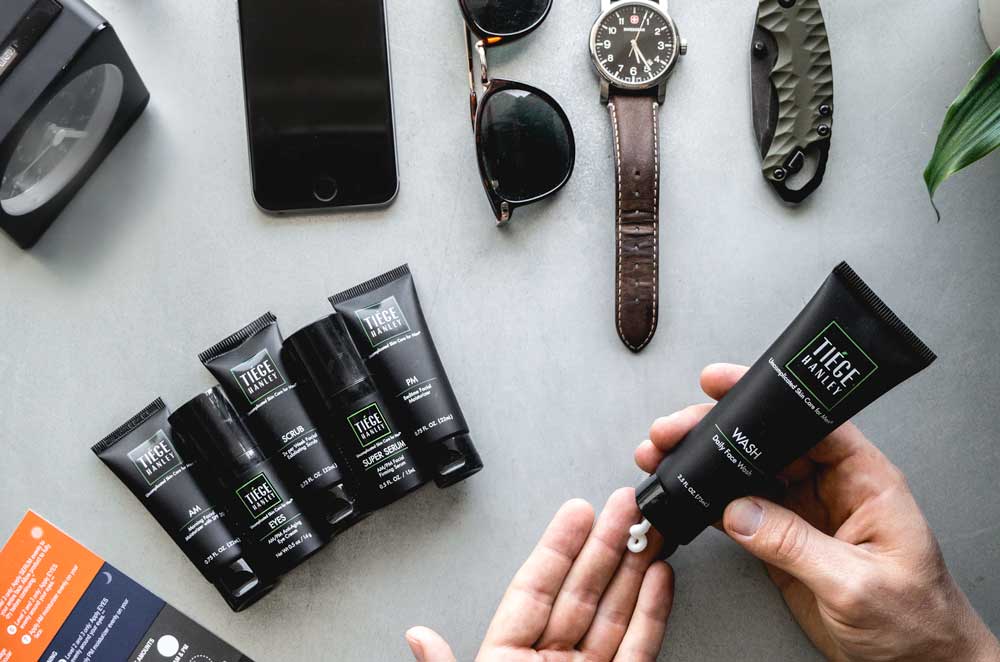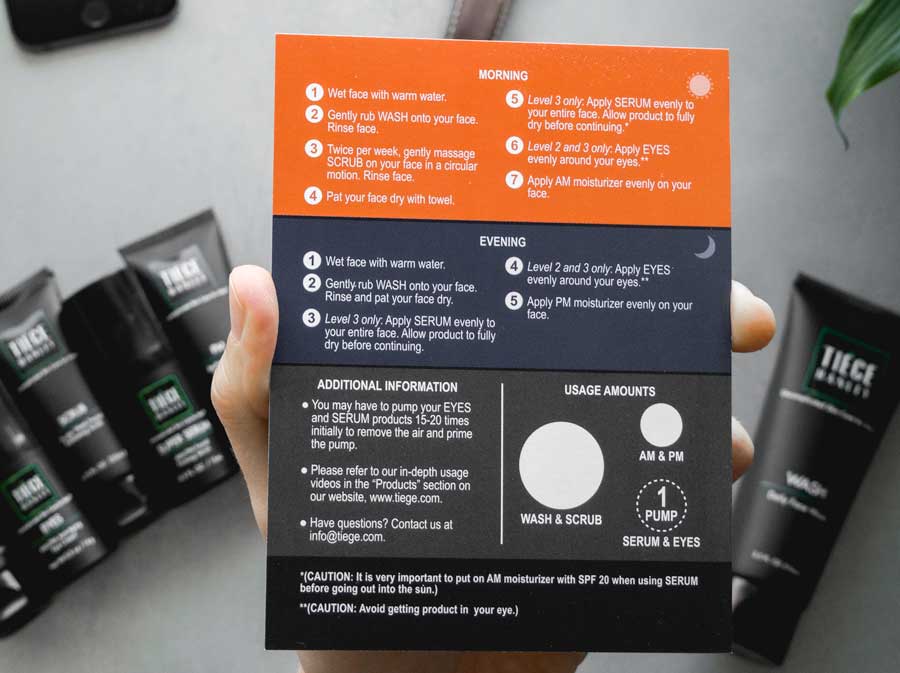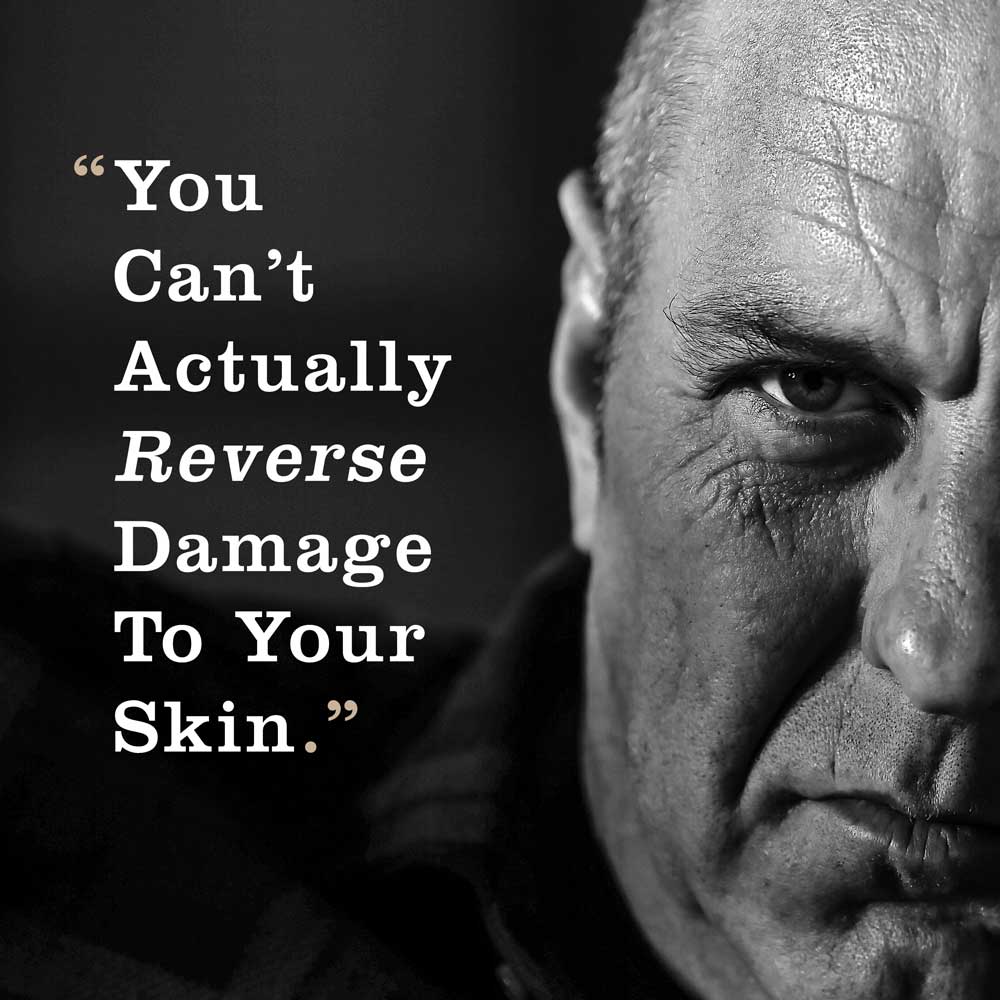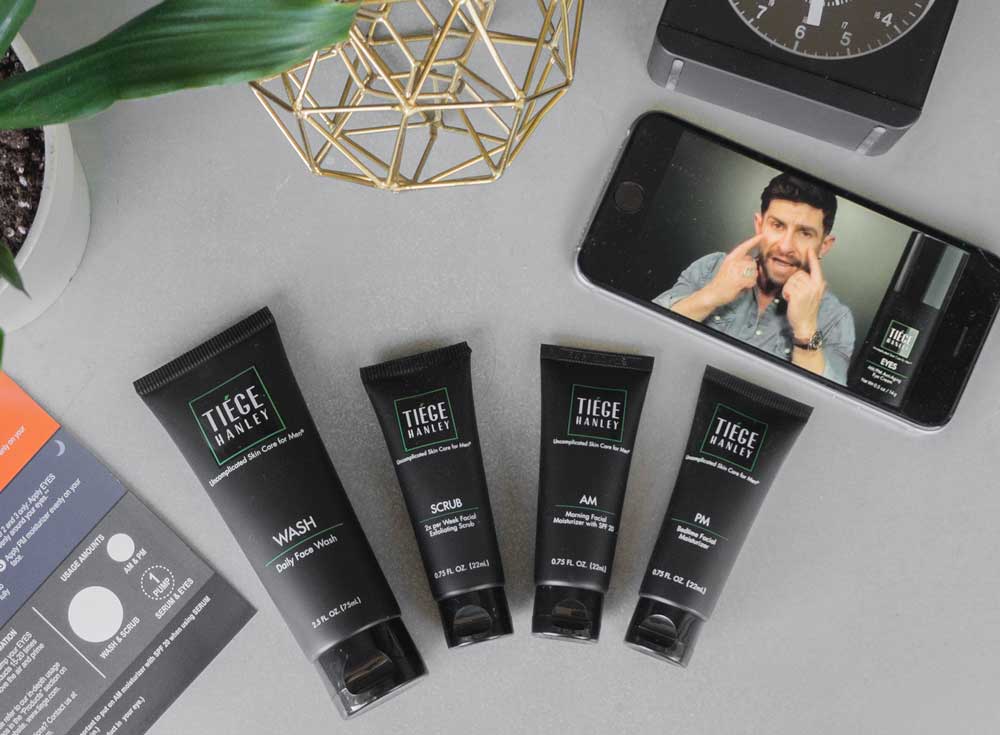 |
Tiege Hanley offers high-end skincare products for men at Target-level prices. Thanks to Tiege Hanley for partnering with us on this post and offering Primer readers an exclusive discount.
What is this? |
How well do you know your own skin?
You’ve no doubt heard your skin is the largest organ of the body, but did you know you shed and replenish the entire thing every 27 to 28 days?
Or that skin accounts for about 15% of your body weight?
Or that five different types of receptors, 1,000+ species of bacteria, and several types of helpful oils make up your skin’s complex microbiome?
Whether you know all the party facts about your skin or not, we all know one thing: we’re all supposed to take better care of our skin – and our face in particular.
So why don’t we?
The reasons are compelling: the skincare industry makes their products complicated, opaque, and difficult to understand. That, in turn, makes it hard to trust that you’re getting good value for your dollar – and skin care can get expensive.
It’s also intimidating to try and inform yourself because there’s a blizzard of information out there – some of it good, much of it not.
It’s Fine To Blow Off Your Skin… Until It Isn’t
The final factor in why many guys don’t properly care for their skin? Until you reach a certain age when skin aging is too far advanced not to notice, most of us feel we can kinda… just… ignore it.
Is there another major part of hygiene you can do that with?
Even though it’s totally understandable, here’s the problem with blowing off your skin: as researchers learn more and more about how the science of your skin works, it becomes clearer and clearer – ignore proper skin care and pay the price.
Think about it this way: you use toothpaste (and floss…right??) at least twice a day, every day, for basic upkeep.
Why is your face any different than your teeth?
When you dig into the science of your skin, the truth is – it’s not. That’s why we’ve looked into the issue and broken down five of the most common and important facts every guy should know about his own skin… but probably doesn’t.
Along the way, we’ll provide some of the vital fixes and best practices to help maintain your skin properly, ensuring it stays looking its best for decades to come.
1. Your Skin Starts Aging At College Graduation
A lot of people think your skin doesn’t start to age until your 30s, or even your 40s if you have “good skin.”
False.
The natural aging of the skin is underway by 25, and some studies show it commences at commencement: the aging process is already underway by your early 20s.
What most people think of as visibly aged skin is, in fact, the cumulative effect of several different cellular-level processes that begin in different decades of life and compound one another.
The first process, which begins in your 20s, is a drop in your body’s production of natural antioxidants. Antioxidants are important because they neutralize harmful chemicals in our environment called free radicals (oxidation is when electrons are stripped from a chemical specie, making it potentially unstable and, as a result, damaging to tissue – hence, antioxidants combat the oxidation process).
The next age-related process kicks off in your 30s and it’s the normal, inevitable slowing of your metabolism. Because metabolism is the sum total of all the energy used for all chemical processes in the body, there’s a slowdown in some of the things that help repair skin. Of note is a slowdown in the creation of collagen, a critical structural element of your visage.
This dynamic repeats and intensifies in your 40s, 50s, and 60s – each decade, a new process that protects, repairs, and replenishes your skin slows down.
It began in your 20s. It’s happening right now. And it’s a big reason you want to ensure that your skin maintenance routine includes moisturizers with Vitamin B3 (an antioxidant) and soluble collagen (to replenish your collagen slowdown). You can find both in the Tiege Hanley Bedtime Facial Moisturizer.
2. Sunscreen Is Really Important for Skin Health
I used to have this idea: get out in the sun, get a little “base” tan, and you can skimp – or skip – on the sunscreen.
How foolish.
There’s absolutely no substitute for protecting your skin from the sun’s UVA and UVB rays other than sunscreen. And the list of messed up stuff UV radiation does to your skin is long and scary.
UVA and UVB rays are highly energetic, so they penetrate skin more deeply than visible light and cause damage to DNA, photo-aging, pigment changes, and – with enough exposure – make cancer far more likely.
To protect against both UVA and UVB rays you need to seek out a broad spectrum sunscreen of at least 15 SPF. The Sun Protection Factor, or SPF number refers to the duration of time a sunscreen will protect you from a burn, not necessarily it’s UV-blocking potency (SPF 15 blocks 94% of UV rays; SPF 30 – about 97%).

Even on cloudy days or days you're not at the beach, it's essential to protect your face with at least a 15 SPF. Making a moisturizer with SPF protection a part of your morning routine is one of the smartest things you can do for your face long-term.
It can be a tough sell to add sunscreen to your morning routine – after all, you’re heading to the office, not the beach.
The solution: use a facial moisturizer that includes a medium-to-low SPF that will do the necessary work of blocking UV rays during your most vulnerable time during the day.
Tiege Hanley’s Morning Facial Moisturizer clocks in at 20 SPF and includes three of the most expert-recommended UV-blocking compounds: Ethylhexyl Methoxycinnamate, Butyl Methoxydibenzoylmethane, and Octocrylene.
3. Bar Soap Is Actually Pretty Bad For Your Skin
Look, I like my soap choices to honor my Irish heritage but the science is unequivocal on this one: bar soap is unnecessarily harsh for facial skin. And it definitely does more harm than a gentle facial cleanser.
Regular soap actually removes some of the protective oils that help keep your facial tissues moisturized and at the proper pH. The result is dry skin and, during the winter months, a susceptibility to windburn or rash.
The solution: switch to a specially-formulated facial cleanser that cleans without doing damage to your skin’s natural ecosystem.
Think about it this way: you don’t use concentrated bleach to clean every surface in your house because it’s unnecessarily powerful. The same goes for your skin – it’s actually a complex, living organ that varies in thickness and toughness across the body.
Use bar soap for your feet. Use a facial cleanser for your face. It’s common sense.
4. Your Skin Has Its Own Nutritional Needs
You already know your skin is the largest organ of your body – are you feeding it properly?
Take your brain: it prefers glucose but can get by on ketones in a pinch.
Your skin is no different – it has a unique set of organic and inorganic nutrients it needs to protect, repair, and sustain itself. Just like any other organ – it needs to be fed the right things.
This is especially true when it comes to antioxidants (remember those?) such as beta-carotene and vitamins C, D, E, and A. Here’s a breakdown of what your skin’s favorite vitamins do:
- Vitamin A: Reduces/repairs sun damage
- Vitamin D: Reduces spotting
- Vitamin C: Antioxidant – provides sun protection
- Vitamin E: Antioxidant – aging & sun protection
A key source of all of these are colorful fruits and vegetables, so make sure your intake is average or better.
If you want to take your skin nutrition to the next level, choose supplements that mimic or amplify the natural antioxidants from your diet. The Tiege Hanley AM/PM Firming Serum contains key nutrients, including Vitamin A, Sodium Hyaluronate (which promotes nutrient absorption), and green tea extract (a well-studied source of antioxidants).
Whatever skin health supplement you choose, ensure it’s got the proper nutrients for skin maintenance and repair.
5. You Can’t Actually Reverse Damage To Your Skin
There’s a whole industry out there selling the Lazarus effect: buy X and it will turn back the hands of time.
But you’re not falling for that. You know what physicists the world over know: time moves in one direction.
The good news is: you can slow skin damage to a virtual stop with the right cleansing and moisturizing, supplements, sun protection, and proper nutrition.
Do ‘cleansing, supplements, sun protection, and proper nutrition’ sound familiar? They should (see #1-4 above), and we bring them up for a reason: you have to do all four to arrest the skin’s aging process.
Which brings us to the big reason we like what Tiege Hanley does: they already know the science of your skin, and have created a system of products that address its key needs in one neat package. You don’t just use mouthwash and skip the brushing and flossing, right? Tiege Hanley designed their system from the ground up to be a total, affordable solution.
Tiege Hanley: Quality Skin Care That’s Dead Simple
Complexity, cost, and confusing products – all sound reasons not to start caring for your skin when it matters most (i.e., today). The folks at Tiege Hanley have thoughtfully designed their entire system so you don’t have to think about all that stuff.
When you receive a Tiege Hanley box each product is clearly labeled by when it should be used (morning or night) and the names are self-explanatory: Face Wash, Morning Facial Moisturizer, Bedtime Facial Moisturizer, and so on.

Tiege makes your skin routine effortless, from naming the products like “AM” or “PM” all the way down to providing a card to show you the small amount you actually need to use of each. Click here for a Primer reader exclusive deal.
The simplicity doesn’t end there: everything you need is in the box. No shopping for missing products at the drugstore.
Tiege also includes an instruction card that breaks down the routine and actually shows you how much to use of each product – posted next to your bathroom mirror for the first month and you’re good to go.
If you’re subscribed, a new box arrives right as you finish your old one.
Tiege is skincare, uncomplicated.

The step by step card that comes with Tiege Hanley.
You can also rely on the quality of Tiege ingredients and expertise: their in-house scientist works directly with leading global skin care brands and they utilize the same level of ingredients used in luxury products.
With boxes starting at $25 for 4 products, it breaks down to $6.25 per product. That’s Target level pricing for premium level skin care products.
Now You Have The Facts – What’s Next?
It’s unglamorous but true: cleansing, supplements, sun protection, and proper nutrition are all necessary facets of quality skin care.
Click here to check out Tiege Hanley's Primer exclusive offer














![It’s Time to Begin Again: 3 Uncomfortable Frameworks That Will Make Your New Year More Meaningful [Audio Essay + Article]](https://www.primermagazine.com/wp-content/uploads/2025/01/begin_again_feature.jpg)



